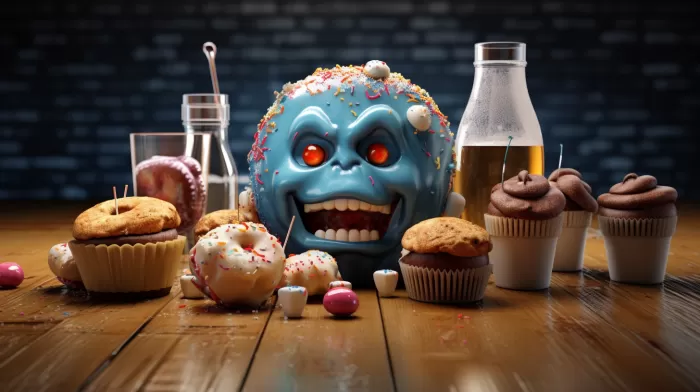A young mother working graveyard shifts recently visited my office, complaining of acid reflux and various other symptoms. When our discussion turned to what she might be eating that could cause such stomach pain, she confessed her daily addiction to Coca Cola. If you’ve ever felt like a slave to unhealthy food cravings, there are things you need to understand about the powerful brain chemicals involved and some essential strategies for gaining your power back.
Addiction or Craving?
Addiction results when you ingest a pleasurable substance (drug or food) or engage in a pleasurable activity (gambling, sex, shopping) that becomes compulsive and is harmful to your health, relationships, or job function. Unfortunately, our society has created many tasty food choices that, when consumed over time, will undoubtedly interfere with our health. Donuts, ice cream, French fries, colas, and more make up a list you’re probably familiar with. Most of these foods are essentially “dead” and lead to numerous chronic diseases and unhappiness if consumed for too long.
So how does the human brain develop an addiction to something as seemingly harmless as food? It’s because your brain chemistry gets involved like it does with addictive drugs. Refined sugars (sucrose and its many cousins) have been compared to addictive substances, possibly even worse than drugs. Foods high in sugar (and trans-fat) change your brain chemistry much like drugs do, and once your brain has been trained to need them to feel good, you’ll need to keep consuming these unhealthy foods.
The Neurochemistry of Food Addiction
Neurotransmitters are natural brain chemicals that carry messages to your brain and body to regulate your mood and appetite. The main neurotransmitter that plays a significant role in food addiction is dopamine, better known as the “feel good” hormone. Many studies have shown that binging on sugar specifically causes a release of dopamine.
There is a similarity between food addiction and food craving. Craving tasty yet unhealthy food is simply a result of eating it repeatedly. Although these nerve pathways strengthen the more you eat these junk foods, they also lessen the longer you can go without them.
The Emotional Connection to Food Addiction
Craving nutritional food when you get hungry is natural. But for most people, craving unhealthy food gets significantly stronger the more emotionally stressed you are. That’s because unhealthy foods bring instant pleasure, causing your brain dopamine to surge.
Feeling hungry and stressed, and having access to unhealthy food is what I call the Triple Threat. Your best defense against the Triple Threat is:
- Not allowing yourself to grocery shop when you’re stressed or hungry
- Filling your fridge and pantry with healthy foods that you can quickly eat if you do get stressed and hungry at home (where you have access to food)
The other neurotransmitter involved in stress is serotonin, which can result in depression and anxiety if at low levels. Junk foods high in sugar and trans-fat help boost serotonin to feel better but provide only a short-term benefit. What else is happening while you feel good for a few minutes, is your nerve pathways are creating a pattern of needing more serotonin, much like with dopamine.
Why You “Can’t Eat Just One”
Refined sugar tops the list of addictive foods, and not all foods with sugar are equally addictive. The fast food and junk food industries use hundreds of modified food compounds (additives, preservatives) to increase appetite and cravings.
Scientists known as “flavorists” create these flavor compounds to make you hungry soon after eating them. Artificial sweeteners, like Nutrasweet (aspartame) and Splenda (sucralose), are not just found in sweet foods. Another famous one is MSG (monosodium glutamate). MSG is added to soups, snack chips, pre-made meals, frozen foods, canned goods, and fast foods to make them “taste good.”
Be aware of all those foods in a box, bottle, package, or can: they contain preservatives that will increase cravings and addictions if you let them.
In conclusion, understanding the science behind food addiction, and being aware of how certain foods can affect your mood, is crucial in reducing unhealthy cravings.



